The content of the article
Children often have many unpleasant habits. The most common of them - nail nibbling (onychophagy). For some people, this habit remains for the rest of their lives, while others find ways to overcome it. It is better to wean the child to bite his nails as soon as possible. The longer the habit exists, the more harm it brings, and the harder it is to get rid of it. Why does the child bite his nails, how is it dangerous and how to wean him?
Why is this habit dangerous?
Why do children forbid to gnaw nails? Perhaps there is nothing terrible? Grow up - unlearn? In fact, this is a fairly common misconception. Nibbling nails can really harm the health of the child. First of all, due to the following reasons:
- Sores and microcracks. If a child bites his nails, he inevitably damages the skin around them.The wounds on the hands are quite sore, they bake and often become infected. At this place, inflammation occurs.
- Intrusion of a dangerous infection. Through a wound, pathogenic microorganisms fall under the skin and into the blood. Thus, septic complications can develop, such as: felon, paronychia, phlegmon. Sometimes the only way to treat them is to remove the affected tissue, even to amputate a finger. In addition, by entering the bloodstream, the infection can cause septicemia and damage the internal organs.
- Aesthetic imperfection. Agree, gnawed nails do not look the best way. The older a child becomes, the more attention others pay to their appearance. This habit can cause peer ridicule.
- Damage to the nail plate. A systematic mechanical effect can lead to the fact that the child’s nails will begin to flake, crumble, and may stop growing altogether. Especially a lot of trouble it will bring the girls in the future, when they want to have a beautiful manicure, but their nails will be spoiled.
- Fungi infestation. As a result of nibbling on the nails, cracks may appear through which the fungus penetrates under the nail plate and begins to multiply there.Remember that getting rid of the fungus on the nails especially in a child is quite difficult.
- Swallowing bacteria and parasites. Under the nails of a child can be millions of different microorganisms. Even on clean, freshly washed human hands, a certain amount of bacteria is preserved. What to say that the child pulls dirty hands into his mouth. It is because of this addiction that most children become infected with pinworms, which almost never happens in adults. In addition, the development of various gastrointestinal infections is possible.
- Inhalation of the nails. This complication occurs quite rarely, more often observed in young children, less often in schoolchildren. The child can not breathe during nibbling of the nail, sometimes its particles fall into the respiratory system. Here they cause irritation, spasm, coughing up. Sometimes a particle goes out on its own through coughing movements, sometimes it causes persistent laryngospasm, which is why the child begins to choke. In addition, once in the lower parts of the respiratory system, such an irritant can cause inflammatory diseases of the lungs.
- Damage to the digestive system. If a child not only gnaws at his nails, but also swallows them, he can provoke damage to his esophagus, stomach or intestines. The fact is that the sharp edge of the nail can easily scratch the delicate mucosa of the hollow organs of the gastrointestinal tract. Such damage will lead to inflammation and pain. In addition, due to the blurred clinical picture and the fact that nail nibbling is held back, a child may be diagnosed incorrectly.
Causes of onychophagy in children
Why do children begin to bite their nails? In some of them, this habit arises from the moment of teething, in others after going to kindergarten, in others at school age, less often onychophagy appears closer to puberty. In most cases, this habit arises from psychological problems.
Have you ever noticed how adults, worrying, start to bite their lips or gnaw a pen? Exactly the same reaction can be observed in children, but they often bite their nails. So what pushes them to this act? There can be several reasons:
- Mechanical irritation. The child may simply form a burr or break a nail.Everyone knows how unpleasant it is to cling to your fingernail for everything. In this case, the child may try to bite off the nail bothering him so that he does not cause inconvenience.
- Autoagression. Parents should take this phenomenon as seriously as possible. In this case, the child does not just bite his nails, he deliberately inflicts damage to himself. This not only affects the nails, but also the skin around the fingers. The child gets pleasure from what makes himself hurt. Thus, the onset of various mental illnesses can manifest itself; therefore, it is better to show this child to a child psychotherapist right away.
- Attempts to calm yourself. In this case, the child calms down when he starts biting his nails. In principle, this phenomenon can be called normal. Equivalent to this is chewing the gum, biting the lips, or the habit of nibbling the handle. However, this also should wean the child. It is necessary to understand in what situations the child is nervous and try to help him overcome them.
- Out of aggression. This is another rather unpleasant reason. The child starts to bite his nails when he is just angry. At the same time, he is not angry with himself, and not with himself he is trying to hurt, just throws out negative emotions in this form.At the same time, if such a child starts to be scolded for oniophagy, he will become even more angry and will take up his own again.
- Boredom. Children often bite their nails simply because they have nothing to do. Children have a lot of energy, much more than adults. This energy is always looking for some way out. If no one plays with a child, and he communicates little with his peers, then you have to look for your own ways of entertainment. Gnawing nails in this case seems to be a fun activity for a child.
- Habit pull in the mouth. As a rule, this condition passes in a child already in the second year of life. He stops lifting everything from the floor and no longer pulls his fingers into his mouth. However, sometimes the habit remains for a longer period. In this case, onychophagy is a transformation of the child's sucking reflex. The same mechanism explains why some babies begin to bite their nails when they drop the nipple.
- Nails are a favorite treat. Surprisingly, some children like the taste of nails. This is completely inexplicable. It seems that nails have no taste at all. But something the children find in them for themselves. Perhaps their body lacks some minerals or trace elements, hence the strange need to bite your nails.
How to wean a child to bite nails
We decided that nail biting is bad, and figured out the causes of this habit. However, the main question remains open: how to wean a child from her? It should immediately be said that persuasions and explanations in this matter will not bring any benefit. Imagine how you will explain to a child that he has pinworms that will give him a lot of inconvenience. And if it is found in the kindergarten, then he will also be forced to stay at home, and my mother will have to go with him to the hospital, and she needs to work. Does a child get into this story and stop biting his nails? Hardly.
Another unfortunate weaning option is bullying. Stories like: if you bite your nails, microbes will fall into the wound, inflammation will develop there and your uncle will cut off your finger - they will make an indelible impression on the child, maybe even too much, but they are unlikely to stop nail biting. Such a child will be afraid to hide, but continue to do their job.
First of all, it is necessary to identify the cause of this behavior of the child. If agnails simply interfere with it, start more often to monitor the condition of its nails.If you teach a child to the fact that well-groomed marigolds are beautiful, then he will not want to nibble them.
If a child is too aggressive or worries a lot, it must be shown to a child psychologist or a psychotherapist. In addition, various sedatives can help. For example, a bath with lavender oil, warm milk, tea with chamomile.
There are various supposedly effective methods that help wean the child from oniophagy. For example, some parents smear mustard on baby’s nails. The child begins to bite his nails, it becomes painful for him to bitter, and he throws this thing. In fact, such a method is more dangerous than effective. Imagine that a child who tries to fight stress with onychophagy eats mustard instead of a nail. For him, this is a new stress and the consequences of such a state may be the most unpredictable. All kinds of bitter varnishes can have a similar effect.
It can be concluded that onychophagy is a fairly common phenomenon. It can have the most unpleasant consequences, because it is worth it as soon as possible to wean your child's nail biting. Remember that it is possible to fight onychophagy only by acting on the cause of its occurrence.
Video: how to wean a child to bite his nails

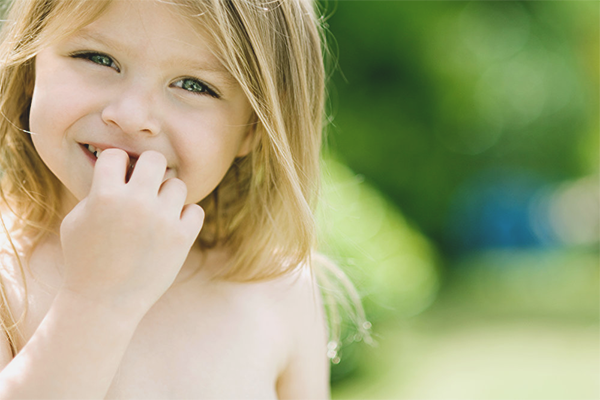
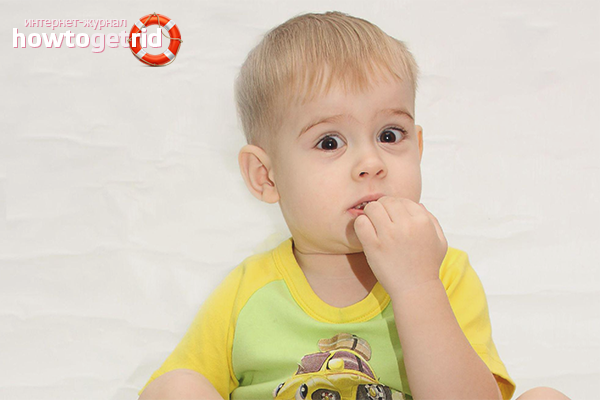

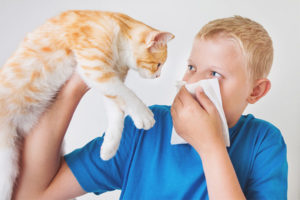

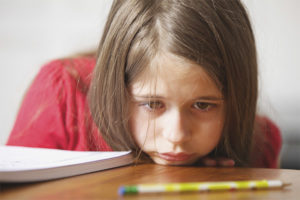
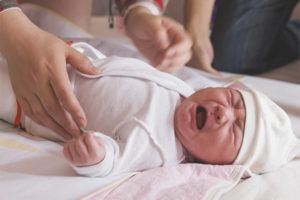
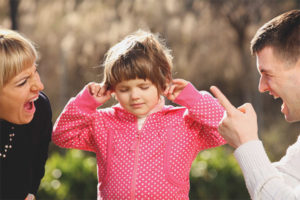

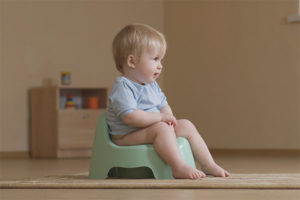
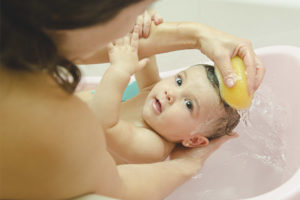
To send